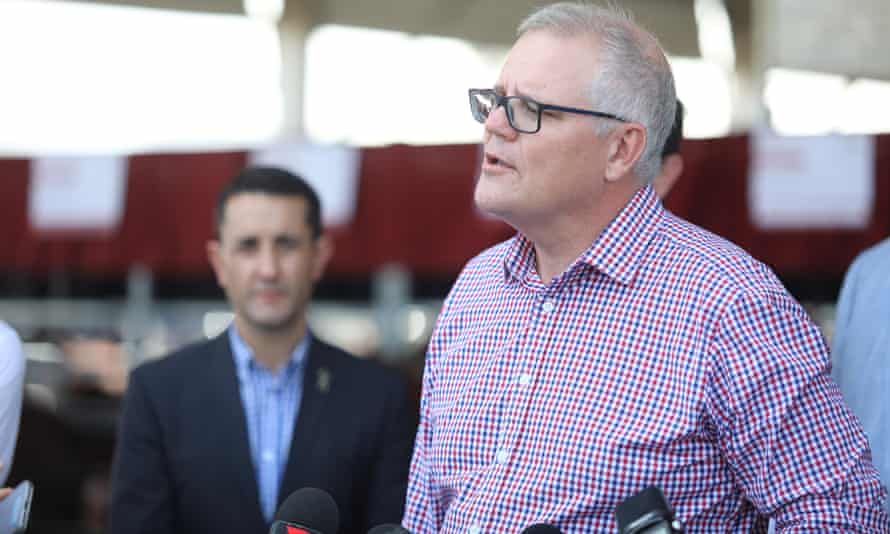Extract from The Guardian

Last modified on Tue 4 May 2021 16.50 AEST
Karl Stefanovic, the breakfast television host, opened Tuesday morning with a bouncer. “Prime minister, good morning to you. Do you have blood on your hands?” With cows mooing gently around him in Rockhampton, Scott Morrison attempted to belt Stefanovic’s bouncer to the boundary. “No, [that’s] obviously absurd.”
Morrison’s difficulty was the former Test cricketer Michael Slater had invoked prime ministerial blood on hands to blast the government’s extraordinary decision to criminalise Australians attempting to get home from Covid-ravaged India. Obviously Slater’s language was memorable.
But Australia’s chief medical officer, Paul Kelly, created the evidentiary base for Slater’s central charge by telling the government, in very clear written advice last Friday, that citizens stranded in India faced the prospect of serious illness without access to proper healthcare, and a “worst-case scenario” of death.
Kelly’s point wasn’t hyperbolic. It was an articulation of fact. Serious illness and death are obvious potential consequences of Australia’s decision to “pause” returns from India, because India is currently in the grip of a humanitarian disaster. The country’s health system is collapsing under the weight of runaway Covid-19 infections.
The coronavirus pandemic has forced the governments of Australia and the governments of the world to make very tough decisions. That’s what catastrophes do. But we all need to be very clear about the potential consequences of this decision for our fellow citizens who can’t get home.
We need to understand that people who had been given permission to travel to India by the Australian government are now being left by the same government to fend for themselves until authorities can clear a backlog of Covid cases currently in Australian quarantine. Slater articulated this point economically with his pointed contribution on social media, noting he had “government permission” to work on the Indian Premier League “but now I have government neglect”.
Government permission to travel isn’t a warranty during a pandemic. People are ultimately responsible for the calculated risks they take.
But being abandoned by their government has evidently come as a profound shock not only to Slater – a citizen with resources and certain advantages – but also to less privileged Australians who scrambled to India to nurse their dying parents or deal with other family emergencies that they felt could not be deferred. Presumably they imagined Australian citizenship conferred certain protections.
The vulnerable cohort of Australians currently stranded in India is said to number 650 people. Government MPs – fielding a significant backlash from the Indian community in their electorates – are now in full clamour internally about getting emergency repatriation flights happening, preferably yesterday, and hopefully tomorrow.
As well as being clear about the human consequences of this decision, we also need clarity about some of the contributory negligence (in a policy-making sense) sitting behind it.
We’ve covered the perversity of people being given permission to travel to India, only to have the drawbridge pulled up behind them. We then need to add Australia’s domestic coronavirus vaccination program running behind schedule. This is a story of bad luck and bad judgments, but the obvious point to make is this: while other countries that have managed to vaccinate their citizens rapidly are preparing to reopen, Australia remains in a bubble.
As well as the troubles with vaccinations, there has also been a domestic discussion spanning many months about the ongoing adequacy of hotel quarantine. Hotel quarantine was an improvised solution in the early days of the pandemic, but for months, there’s been debate about whether Australia needs a different strategy, including more specialised facilities to deal with surges.
As the former bureaucrat Jane Halton noted months ago in a review of hotel quarantine, “pressure to increase travel to and from Australia is growing”. Furthermore: “Existing models of quarantine are unlikely to be able to expand significantly above current levels and new approaches that manage risk are needed – an ability to add scale through surge capacity should be considered.”
Having worked through the human consequences of contributory policy negligence, we now reach the dreaded politics, which I confess I’m less interested in, given what’s actually on the line here. So let’s summarise this quickly.
Morrison has had a rough few months politically, so it shouldn’t surprise us that the prime minister has now assumed full stop the boats/fortress Australia/“we decide who comes and the circumstances in which they come” mode.
This is a Coalition default you can set your watch by, and the foghorn politics might even work, given Morrison’s domestic voting audience has been conditioned over several decades to believe that, in Australia, a hard border must always trump a compassionate heart.
But the important thing to remember is while the prime minister is currently focused on presenting his actions as some sort of inspired pre-emption to prevent a third wave of Covid-19 infections in Australia, the reality here is quantifiably different.
The reality is the government is fully intent on masking its own lack of preparation.
There’s also an irony here that won’t be lost on the premiers.
Having spent months lecturing the states about snap border closures not being a proper substitute for an effective public health strategy (“borders … are no substitute for testing, tracing and outbreak containment”), Morrison is now doing exactly what he told the states not to do, and presenting it to voters as a virtue.
No comments:
Post a Comment